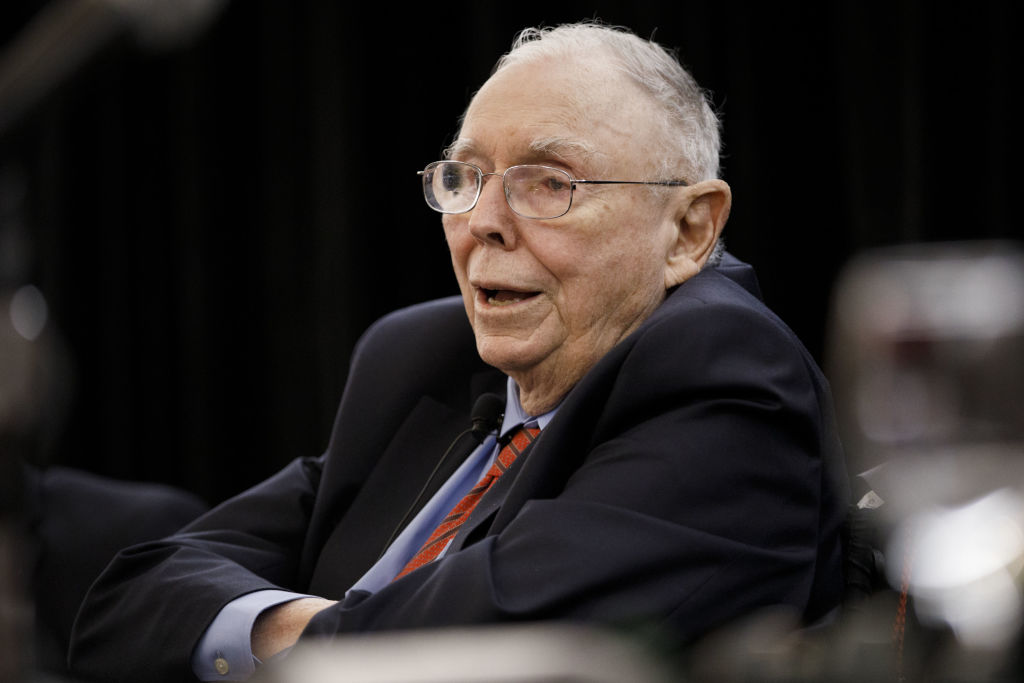Charlie Munger’s top tips for investing
Warren Buffett’s right-hand man Charlie Munger has passed away at age 99. We look at what wisdom he leaves behind and what we can learn from the veteran investor, writes Kalpana Fitzpatrick


Get the latest financial news, insights and expert analysis from our award-winning MoneyWeek team, to help you understand what really matters when it comes to your finances.
You are now subscribed
Your newsletter sign-up was successful
Want to add more newsletters?

Twice daily
MoneyWeek
Get the latest financial news, insights and expert analysis from our award-winning MoneyWeek team, to help you understand what really matters when it comes to your finances.

Four times a week
Look After My Bills
Sign up to our free money-saving newsletter, filled with the latest news and expert advice to help you find the best tips and deals for managing your bills. Start saving today!
Charlie Munger, Warren Buffett's business partner and vice-chair of Berkshire Hathaway, has passed away at age 99.
For years, I've taken all I can learn from legends like Munger; while today’s generation may turn to Instagram or Tiktok to pick up their top tips to start investing and life hacks, true wisdom has always been with veteran investors with clear track records, success stories and bags of inspiration. He was a titan in the world of investing, highly respected and admired by anyone in business and for those who wanted to learn from the best, he was on the list of people you can learn from with his philosophical view of life.
In his last interview for CNBC, Munger talked of how he lived in the same house for decades and refused to live a life where he “looked like the Duke of Westchester”. It was not good for the children, he had said. He’d also once told Warren Buffett to write his own obituary the way he wanted and then live that life.
MoneyWeek
Subscribe to MoneyWeek today and get your first six magazine issues absolutely FREE

Sign up to Money Morning
Don't miss the latest investment and personal finances news, market analysis, plus money-saving tips with our free twice-daily newsletter
Don't miss the latest investment and personal finances news, market analysis, plus money-saving tips with our free twice-daily newsletter
But when it comes to helping you invest, grow wealth and grow wiser - what can we learn from Charlie Munger?
Lifelong learning
Education never really leaves us and it never should. Munger himself always took his time to learn from many areas, which included sociology, maths, physics, psychology - and he was also an architect.
But for anyone investing, it pays to learn about markets to help understand how the world of investing works, and it can help you succeed. If you are looking for opportunities and seeking to grow a business, learn all you can. Understanding other areas of life is just as important as the one you are operating in.
As Munger once said: ”Develop into a lifelong self-learner through vicarious reading. Cultivate curiosity and strive to become a little wiser each day.”
Soldier on and tap into rare opportunities
Speaking on CNBC, Munger said he believed in the “soldier on system”, saying there will be lots of hardship in life, “but you got to soldier on through the rough”.
Munger said “few rare opportunities will come your way, but when they do, you have to recognise them”.
Munger wanted people to recognise that when you have a sure thing, you should always take the opportunity.
Which of course he did as he built Berkshire Hathaway with Buffett.
“Invert, always invert”
Munger was well-known for his ability to invert problems by looking at what didn’t work and then quite simply avoiding it. In other words, Munger would look to solve hard problems by going backwards - and for Munger, it means you can also avoid failures when investing.
Munger once said: “Turn a situation or problem upside down. Look at it backwards. What happens if all our plans go wrong? Where don’t we want to go and how do you get there? Instead of looking for success, make a list of how to fail – through sloth, envy, resentment, self-pity, entitlement, and all the mental habits of self-defeat. Avoid these qualities and you will succeed. Tell me where I’m going to die, so I don’t go there.”
Quality over quantity
Munger often spoke of investing in a few high-quality investments and labelled diversification as “insane”. Rather than diversifying with too many stocks, the veteran investor argued it was better to hold a handful of good investments than a bagful of maybe mediocre or poor ones.
In a Berkshire Hathaway meeting, quoted on CNBC, he once said: “One of the insane things that’s taught in modern university education is that a vast diversification is absolutely mandatory in investing in common stocks. That is an insane idea.
“It’s not that easy to have a vast plethora of good opportunities that are easily identified. And if you’ve only got three, I’d rather it be my best ideas instead of my worst.”
He also always said the ‘big money’ was not in buying and selling, but in waiting.
Get the latest financial news, insights and expert analysis from our award-winning MoneyWeek team, to help you understand what really matters when it comes to your finances.
Kalpana is an award-winning journalist with extensive experience in financial journalism. She is also the author of Invest Now: The Simple Guide to Boosting Your Finances (Heligo) and children's money book Get to Know Money (DK Books).
Her work includes writing for a number of media outlets, from national papers, magazines to books.
She has written for national papers and well-known women’s lifestyle and luxury titles. She was finance editor for Cosmopolitan, Good Housekeeping, Red and Prima.
She started her career at the Financial Times group, covering pensions and investments.
As a money expert, Kalpana is a regular guest on TV and radio – appearances include BBC One’s Morning Live, ITV’s Eat Well, Save Well, Sky News and more. She was also the resident money expert for the BBC Money 101 podcast .
Kalpana writes a monthly money column for Ideal Home and a weekly one for Woman magazine, alongside a monthly 'Ask Kalpana' column for Woman magazine.
Kalpana also often speaks at events. She is passionate about helping people be better with their money; her particular passion is to educate more people about getting started with investing the right way and promoting financial education.
-
 Should you buy an active ETF?
Should you buy an active ETF?ETFs are often mischaracterised as passive products, but they can be a convenient way to add active management to your portfolio
-
 Power up your pension before 5 April – easy ways to save before the tax year end
Power up your pension before 5 April – easy ways to save before the tax year endWith the end of the tax year looming, pension savers currently have a window to review and maximise what’s going into their retirement funds – we look at how
